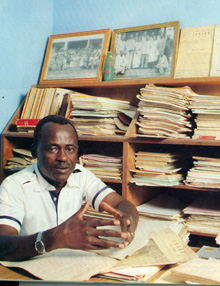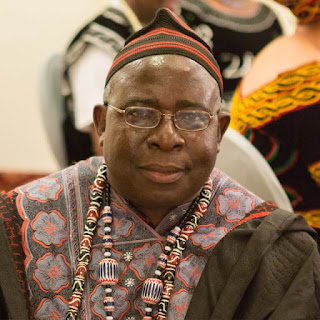 |
| CELESTIN LINGO: RIP COMRADE |
By Ntumfoyn Boh Herbert (Yindo Toh)
It is 5.40am on the East Coast of the USA and I am sitting in bed, and typing this tribute on my smart phone, greatly saddened by news (breaking just now) of the passing into glory in Paris (France) of one of Cameroon's most talented journalists, a friend, "grand frere" and a brother-in-law of mine, Celestin Lingo.
May God rest his gentle soul. And may God grant his family the strength to bear this loss with faith in the Resurrection and certainty in the promise of rewards in Heaven.
Few Cameroonian journalists have contributed more to journalism, to human rights, to political freedoms, to freedom of the press and to freedom of association than Celestin Lingo. And even fewer have devoted more energy or sacrificed more of their freedom, their own time and money in order to help organize and prosper the profession of journalist, which he cherished and served so well.
My recollection - from discussions with him - is that his rich but extremely challenging career dates back to the days of blind political repression in Cameroon following Cameroon's pseudo-independence. Repression targeted notably UPC leaders in the heart of "Bamileke Country" and all those suspected of showing any kind of sympathy to them. At the time, Celestin Lingo worked for one of then two Cameroonian Catholic newspapers (name lost in my memory for now) published out of Nkongsamba by the late Bishop Albert Ndongmo.
The young Lingo's articles on the tragedy unfolding as French and Cameroonian security forces slaughtered citizens of Bamileke and Bassa descent on claims that they were combating so-called "maquisards" badly ruffled feathers in Yaounde. Lingo paid the price in repeated arrests, torture, detention, jail time, including time served in some of Cameroon's worst political prisons. At Tchollire (I believe it was), Celestin Lingo first met and became great friends with another "rebel with a good cause", Albert Mukong. Ultimately, Lingo paid the price of exile, spending a good part of his youth in Côte d'Ivoire where he benefited from the protection of President Houphouet Boigny while pursuing his journalism career at the Ivorian daily, Fraternite Matin.
Before leaving Cameroon, though, Celestin Lingo was tied to every trumped-up charge the Ahmadou Ahidjo regime levied against Bishop Ndongmo. These included accusations of treason for supposedly supporting an armed rebellion against Yaounde. Bishop Ndongmo was later arrested, tried, sentenced to death before being pardoned by President Ahidjo who sent him off to exile in Rome and later to Canada, where he later died.
Some of Lingo's most daring journalism pieces included accounts from what was a war front (neither Yaounde nor Paris admits there was a war). They included stories on the cause the rebel leaders felt it was worthwhile dying for, including the cry for true independence and democratic elections. Much of his early trouble as a journalist stemmed from the fact that Lingo insisted on sacrificing his own freedom rather than revealing his sources from among the ranks of the armed insurrection.
 |
| LINGO |
Celestin Lingo was a contributor (I don't just remember exactly how) to one of the finest and earliest pieces of investigative journalism published by the sister Catholic newspaper managed by the late Bishop Jean Zoa out of Yaounde. The article, under the title "Le Train de la Mort", hit Yaounde like a political earthquake. The paper had won its first "hide and seek" game with the regime, publishing what has to be considered one of Cameroon's unrewarded but Pulitzer-deserving pieces.
To make it to print, L'Effort Camerounais intentionally - and criminally, according to the Law of the Tyrant in power at the time - bypassed what was then compulsory administrative censorship in order to unearth and decry a massive government cover-up following the assassination of mostly Bamileke and Bassa rebel leaders. The publication of this article strained relations between Bishop Jean Zoa and Cameroon's first dictator, Ahmadou Ahidjo. The Yaounde regime, the article outlined, had sardine-parked so-called rebel leaders into windowless wagons of a train. They were, sadly, starved of oxygen and baked in the sweltering heat of "Douala and Bassa Country" which they crossed en route from Douala to Yaounde, dying of asphyxiation in the process.
When Celestin Lingo returned from exile in Côte d'Ivoire, he signed up with the government-owned daily, Cameroon Tribune, where it would be fair to say, he made a living but could not practice journalism. He had to do something about it. That is when Lingo became a "two-in-one" journalist: signing articles under his real name for the "Journal de la Route de l'Aeroport" while peppering the regime in one of Cameroon's best satiric columns in Le Messager under the pen name Daniel Rim.
The history of Cameroon's independent media cannot be written without devoting a chapter to stress the immense contributions of this national hero: Celestin Lingo alias Daniel Rim. So, too, for the history of the return to political pluralism and the history of the organization of the profession itself in Cameroon.
Under the leadership of Emmanuel Noubissie Ngankam, at the time the Resident Representative of the German Foundation, Frederic Ebert Stiftung, Celestin Lingo chaired what was called The Core Group of sixteen journalists tasked with executing a strategy to found and launch what is today's Union of Cameroon Journalists (UCJ). I was privileged to serve under Celestin Lingo in that Core Group and can testify to the exemplary leadership that was part of his many gifts and stellar qualities. I went on to serve as the pioneer Secretary General of UCJ.
Celestin Lingo did not get elected to that first leadership team but he showed a lot of class when, along in the company of colleagues like Andre Parfait Bell, he expressed full understanding of the need to protect the newborn association from persecution by the regime in order to guarantee it a fighting chance of success. That is how the position of UCJ Pioneer President ended up with the now jailed ex-General Manager of CRTV, Amadou Vamoulke. The fear - real at the time - was that with leadership of UCJ exclusively in the hands of a group of journalists seen as hostile to the regime would strengthen the perception and suggestions at the time of its birth that UCJ was just another opposition political party masquerading as an association of journalists.
It is remarkable that despite a tiny moment of bitterness, Celestin Lingo offered enthusiastic support and continued advice to that first UCJ leadership team, quickly putting hurt feelings behind him and joining hands to make the association work for all journalists. He was among the very first to spot and offer help in mending the cranky relationships among the leadership team. He was by my side, encouraging me to break with Vamoulke notably in order to decry the detention of journalists like Pius Njawe and Paddy Mbawa. I can still this morning, as I write these lines and memories of Lingo flood my mind, recall him warning repeatedly of the commitment of The Core Group to use UCJ as an instrument for helping journalists come out of what we identified as "Cameroon's monolithic hangover".
 |
| BOH HERBERT |
Celestin Lingo and I spoke thrice on the phone since he self-evacuated to Paris to get the kind of medical attention the country he served all his life still cannot afford its citizens more than a half century after what passes for independence. When we spoke on the phone last, Celestin Lingo was still booming with that great, healthy laugh of his. He cracked you up with jokes - one after another - including jokes about the cancer that had afflicted his body but could never steal or destroy his high spirits, jovial disposition, good humor and unquestionable optimism. One of his very last emails to me and others (see below) was aimed at sharing laughter, cheering people along with a joke about MP.
It is worth mentioning that even as Celestin Lingo alias Daniel Rim lived in Paris - waiting to die, as he joked about it on the phone with me - he remained a reservoir of hope. He maintained his deep faith in God and in the unique goodness of Christianity. Also, he spoke in superlatives of one of his very best friends; the man he called his best priest; his best bishop since Bishop Ndongmo; his best pastor, cardinal and best mentors: Christian Cardinal Tumi. On him, Lingo authored one of several books, celebrating the beauty of a simple life, at the service of one's neighbor, one's country, and our common humanity. The life of Celestin Lingo alias Daniel Rim was true to that creed. May he find eternal rest in God, his Creator.
Ntumfoyn Boh Herbert (Yindo Toh)
No comments:
Post a Comment